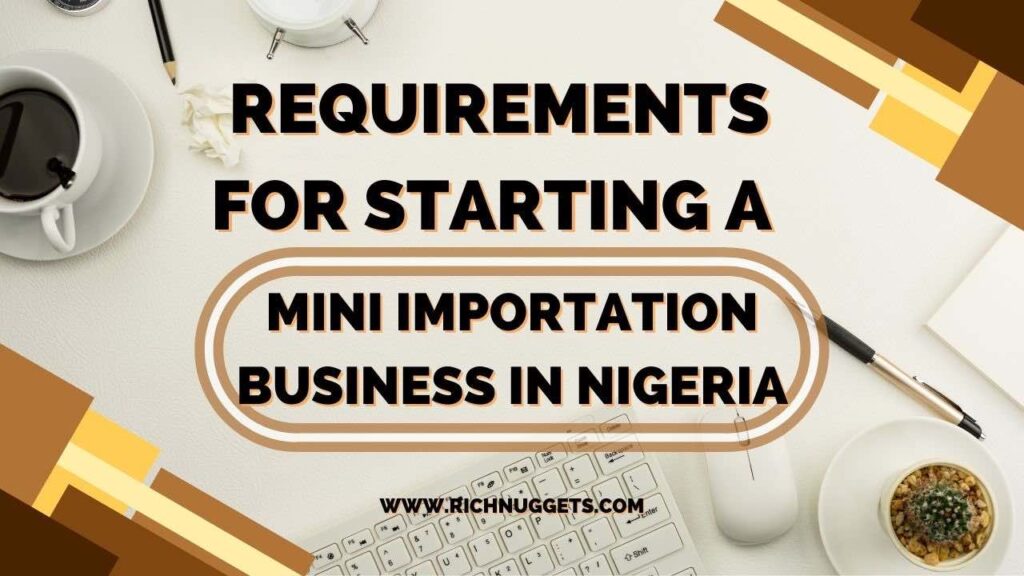
Today, we find ourselves in an era where opportunities are within reach, even from the comfort of our own homes.
One such opportunity that has gained significant traction in recent years is mini importation—a business venture that has revolutionized the way Nigerians engage in commerce.
In this article, I won’t only be showing how to start a mini importation business in Nigeria, but also other intricacies needed (cost inclusive) in doing the mini importation business in Nigeria.
Table of Contents

Starting a mini importation business in Nigeria can be an exciting and rewarding venture. Here’s a step-by-step guide to help you get started:
Conduct Market Research:
Begin by identifying lucrative product niches and market trends. Consider factors such as demand, competition, and profitability. Look for products that have a high demand but limited availability locally.
List of products that are in high demand for you to start your importation business with;
- Phone Accessories
- Beauty Products
- Fashion Products
- Electronics
- Baby Products
- Computer Gadgets
- Gaming
- Home And Office Equipment
Create a Simple Business Plan:
The business plan shouldn’t be more than two (2) pages. Outline your goals, target market, sourcing strategies, marketing approaches, and financial projections. The business plan might not be too structured but it should be realistic and easy to understand.
You might as well do without a business plan because it is a mini business. But if with time you decide to expand your scale of business, then a professional well-structured business plan will be needed to serve as not just a road to success but a means to bring in investors and lenders on board.
Register Your Business (optional):
If you are a student or a sit-at-home mom who wants to start this business, registering with the CAC for a business name might not be necessary.
But if the goal is to grow and own a shop of yours in a public space then, you should register your business to avoid legal actions
For guidance on business name registration, you can read this comprehensive article
Source Reliable Suppliers:
Research and identify international suppliers who offer high-quality products at competitive prices.
Utilize online platforms, trade directories, and industry networks to find reputable suppliers. Verify their credibility, product quality, and shipping policies before proceeding.
But note that most suppliers are from China.
Another good way to select a better source of suppliers will be to partner with someone already in the mini importation business.
Yes, they might not want to associate with you if you are their competitor. But if they notice that the items you are selling are different from theirs, they will be willing to help you, as that will help reduce their shipping cost burden.
Secure Financing:
Never be too shy to ask for financial assistance from family and friends either as a loan or grant except if you are a known notorious beggar.
And make sure that you are sure of your initial capital requirements because you don’t want to look like a confused business person before them when asking for financial assistance.
Arrange Logistics and Shipping:
The advantage of buying your items online is that they will connect you with a shipping company.
But if you are to buy your items directly from companies in China or any other country, then you should coordinate with freight forwarders or shipping agents to handle the transportation of your imported goods.
Determine the most suitable shipping method based on cost, speed, and the nature of your products. Insurance should also be considered if you are running on a large scale or your items are very expensive.
Manage Inventory and Fulfillment:
Set up efficient inventory management systems to track and organize your stock. Ensure timely fulfillment of orders to maintain customer satisfaction.
Consider partnering with reliable logistics providers or fulfillment centers to handle order processing and delivery.
Market your products:
You can do this through various channels that are suitable for you. But the common marketing channels used by most mini importers in Nigeria are;
- Online Marketing (Instagram, WhatsApp, Facebook, Twitter, etc)
- Word of Mouth; If you are a student or you want to be selling your products from home.
- Website Creation (storefront); if your goal is to reach a larger audience within the Nigerian market.
Provide Excellent Customer Service:
Prioritize customer satisfaction by promptly responding to inquiries, addressing concerns, and providing a seamless buying experience.
Establish strong relationships with your customers through personalized communication and after-sales support. But never sell on credit❗️
How much do you need to start mini importation?

Though there is no fixed amount required to start a mini-importation business in Nigeria, with a minimum of N80,000, you can begin a profitable mini importation business in Nigeria.
To further explain the cost of starting this business, we shall be looking at these two illustrations from our research;
But Note: When determining the budget for your importation business, product selection plays a significant role.
Let’s delve into the illustrations from our research Using USD as the global trading currency.
First, is the importation of Phone Cases, where each phone case cost ¥4.91 ie $0.68 (approximately ₦530). In purchasing 100 phone cases, the procurement cost amounted to $68 (₦53,000).
Additionally, shipping costs from China to Nigeria are around $5 per kilogram, depending on the shipping method. The total weight of the cases was approximately 5 kilograms, thereby resulting in a shipping cost of $25. Hence, the total cost of importing 100 phone cases cost $93 (₦72,121.50).
Illustration 2. The cost implications of importing Bluetooth speakers
Each Bluetooth speaker was purchased at ¥72.21 ie $10 (around ₦7,755.11). In buying 20 speakers, the procurement cost was approximately $200 (₦155,102).
The total weight of the speakers was 10 kilograms. With an estimated shipping rate of $8 per kilogram (remember I said depending on the shipping channel), the shipping cost became $80. Thus, the total cost of importing 20 Bluetooth speakers became $280 (217,140.00).
Note:
The cost of starting an importation business varies depending on factors such as the type of product, the quantity to import, and the associated shipping and clearing charges. For heavier items, shipping charges and customs clearing costs tend to be higher.
It is important to note that sustainable capital is necessary for a successful mini importation business.
Requirements for Starting a Mini Importation Business in Nigeria

Outlined below are the fundamental requirements for starting a mini importation business in Nigeria:
- Capital
- Laptop or Mobile Phone
- Internet Connection
- Email Address
- Delivery Address
- Domiciliary Account or an online dollar account such as Chipper.
- Online accounts such as Facebook, Instagram, WhatsApp, JiJi, Jumia, and/or Konga Account (for marketing purposes)
- Logistics Delivery Agent
The reason for the domiciliary account or the online dollar account is that; CBN banned the use of local currency ATM cards for international transactions.
With these tools at your disposal, you will be well-equipped to launch your mini importation business in Nigeria.
However, it is highly likely that you already possess most of these requirements. So, starting the mini importation business won’t be a problem.
Notice !!!
If you decide to open an account with Chipper, Use my referral link to win $10
Challenges of Starting a Mini Importation Business in Nigeria
Here are some common challenges associated with starting a mini-importation business in Nigeria:
- Customs and Import Regulations: Navigating customs and import regulations can be complex. Understanding and complying with the documentation requirements, import duties, tariffs, and other regulatory processes can be challenging, especially for those new to the importation business.
- Shipping and Logistics: Managing the logistics of importing goods, including selecting reliable shipping methods, tracking shipments, and coordinating with shipping companies, can be a challenge. Delays, damages, or lost shipments directly impact the business and customer satisfaction.
- Currency Fluctuations: Exchange rate fluctuations affect the cost of imported goods and impact profit margins. You will need to be aware of currency trends and consider strategies to mitigate the risks associated with volatile exchange rates.
- Quality Control: Ensuring the quality of imported goods is crucial for customer satisfaction. The inability to physically inspect products before purchase can lead to issues with product quality, which can negatively affect the business’s reputation.
- Payment Challenges: Making international payments for goods and services may pose challenges, including issues related to currency conversion, transaction fees, and payment security. You will need to explore reliable and cost-effective payment solutions.
- Customs Duties and Taxes: Import duties, taxes, and other fees imposed by customs authorities significantly impact the overall cost of imported goods. Understanding and accurately calculating these costs is important for pricing and financial planning.
- Market Trends and Demand: Anticipating market trends and consumer demand for imported goods is essential for business success. You will need to conduct market research to identify viable products and ensure there is demand for your imports.
- Competition: The importation business is competitive, and staying ahead of competitors requires strategic planning and differentiation. Identifying unique products, competitive pricing, and effective marketing are key factors for success.
- Storage and Inventory Management: Managing inventory and finding suitable storage facilities for imported goods can be a logistical challenge. Ensuring proper inventory control, minimizing storage costs, and preventing overstock or stockouts are critical aspects of the business.
- Intellectual Property Concerns: Importing counterfeit or infringing products will lead to legal issues and damage your business reputation. You will need to be vigilant about intellectual property rights and ensure you are sourcing products from reputable suppliers.
- Cultural and Market Sensitivity: Understanding the cultural preferences and market sensitivities of the target audience is crucial. Some products may need to be adapted or marketed differently to suit the local market, and cultural considerations can impact product success.
Despite these challenges, many entrepreneurs successfully operate mini importation businesses in Nigeria by conducting thorough research, staying informed about regulations, building reliable supply chains, and adapting to market dynamics.
KEY RESOURCES:
- How to Start a Business in Nigeria in 9 Easy Steps
- How to Register a Business Name in Nigeria in 7 Easy Steps
- Federal Government Loans for Small Business in Nigeria
- How to Get a Loan to Start a Business in 11 Steps
- How to Start a Business with No Money
READ ALSO:
- Print on Demand Business in Nigeria: The Ways to Profitability
- How to Start a Successful Recharge Card Printing Business
- How to Start a Tshirt Business
- How to Start Logistics Business in Nigeria: A Complete Guide
- How to Start a Dropshipping Business in 6 Steps”
Final thoughts on starting a mini importation business in Nigeria
Remember, starting a mini importation business requires dedication, perseverance, and adaptability. Stay informed, be proactive, and continuously learn from your experiences.
With the right mindset and diligent efforts, you can build a successful mini importation business in Nigeria.
And that wraps it up with how to start a mini importation business in Nigeria.
If you have a question or contribution, please leave them in the comment section below 👇 .
Remember to turn on the Bell 🔔 Notification icon to get updated directly on your device when new articles are published.
Discover more from StartBizEasy
Subscribe to get the latest posts to your email.





